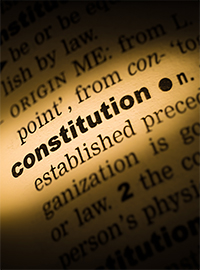| A Crazy Impeachment |
 |
|
By Byron York
Wednesday, January 13 2021 |
Democrats started trying to remove President Donald Trump from office before he entered office. Now they are proposing to remove him from office after he leaves office. How do you remove an ex-president? He's already gone. That is the bizarre question posed by House Speaker Nancy Pelosi's obsessive quest to re-impeach Trump with just a few days left in his term. Why impeach the president now, as the House seeks to do, when there is not enough time for the Senate to hold a trial and pass judgment on the case before Trump's term expires on Wednesday, Jan. 20? Some argue that the Constitution permits the impeachment of a former president. It has never happened in U.S. history, and the question has never been adjudicated. So there is no way to say with 100% confidence what the answer is. But J. Michael Luttig, a former judge on the U.S. Court of Appeals for the Fourth Circuit, makes a convincing case that no, it is not constitutional to impeach a former president. "The crux of my argument is that the very purpose of the impeachment power is to remove an incumbent official," Luttig said in an interview. "That seems to me to be crystal clear and inescapably true under the text of the Constitution itself." Speaking of the text of the Constitution, these are the relevant portions concerning impeachment: "The president, vice president and all civil officers of the United States, shall be removed from office on impeachment for, and conviction of, treason, bribery, or other high crimes and misdemeanors ... "The House of Representatives ... shall have the sole power of impeachment ... "The Senate shall have the sole power to try all impeachments. When sitting for that purpose, they shall be on oath or affirmation. When the President of the United States is tried, the chief justice shall preside: And no person shall be convicted without the concurrence of two-thirds of the members present. "Judgment in cases of impeachment shall not extend further than to removal from office, and disqualification to hold and enjoy any office of honor, trust or profit under the United States: but the party convicted shall nevertheless be liable and subject to indictment, trial, judgment and punishment, according to law." The plain meaning of these passages is that impeachment, in the case of a president, is designed to remove that president from office. A secondary purpose is to disqualify a removed president from ever holding federal office again. "It's the impeachment that is the authority for the disqualification," Luttig said. And a former president, by definition, cannot be removed from office. And, by the way, the Constitution specifically lays out the way to deal with wrongdoing once the president is out of office: He will be "liable and subject to indictment, trial, judgment and punishment, according to law." So the Constitution clearly says how presidential wrongdoing should be addressed, both when the president is in office and when he is out of office. But some Democrats are claiming that they can start impeachment now, when President Trump is in office, and finish it with a Senate trial that takes place, or at least finishes, after the president has left office on Jan. 20. Rep. James Clyburn, the third-ranking Democrat in the House, even suggested that, after passing impeachment articles, the House might hold on to them until President Biden has a chance to enact his 100-day agenda in Congress, and only then send the impeachment to the Senate for trial. At that point, Donald Trump will have been an ex-president for more than three months. It's not clear whether Clyburn's path will be taken, or whether Democrats will pursue some other course. But there is no doubt they are determined to impeach the president again, even though there will not be time for the Senate to hold a trial with any semblance of due process for the president. (For instance, there are real issues surrounding the Democratic charge that he "incited" the rioters who attacked the Capitol last Wednesday.) So given all that, what can the president do? The most important thing he can do is take the question to court. There is a serious constitutional issue involved in a post-presidential impeachment, and Luttig expects the president's lawyers to take the case to the U.S. Court of Appeals for the District of Columbia. I asked him whether the judges there might, as judges often do, seek to stay out of it, deferring to the legislative branch with the argument that it is an issue for Congress, and not the judiciary, to decide. "I don't think so, because it's a constitutional question," Luttig said. "It would be one of the biggest constitutional questions in American history." Byron York is chief political correspondent for The Washington Examiner. |
Related Articles : |
























